The importance of being there
Libreville -- When I got to Gabon to cover the recent election, I found myself the only photographer from a major global news organization in the country. People ask -- why bother covering yet another election and unrest in yet another African country? I tell them - how can we not? This is where Africa’s modern history is unfolding. If we are going to tell the story of Africa, of the narratives that are taking place on the continent, then we cannot back off from coming to places like these.
I take pride in the fact that I’m here and telling the story and that we’re not passing on these kind of events.
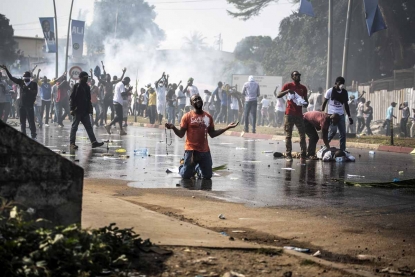 An opposition supporter kneels in front of security forces blocking access to the electoral commission.
(AFP / Marco Longari)
An opposition supporter kneels in front of security forces blocking access to the electoral commission.
(AFP / Marco Longari)Being ‘alone’ covering an election has both advantages and disadvantages. You can say that I have zero professional competition, since my colleagues from our direct competitors aren’t here. But I never like to use the word “competition,” I prefer to use the word “cooperation."
When I’m on a story like this, I’m not competing against anyone, I’m providing a service to our clients. And normally, we photographers work together. You share information, contacts, meals, taxis, you share the day, you share the dangers that come with this kind of an environment. The cooperation results in more complete coverage and is safer for all involved. You can bounce ideas off each other -- “how about we go to this neighborhood to show this aspect of the story,” “no, my contact says it’s a tense situation over there, but in this corner such and such is happening.”
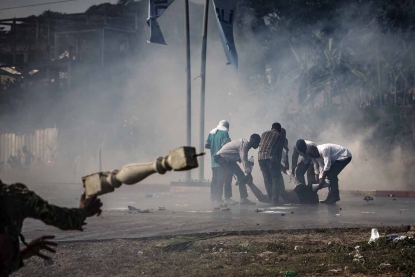 Opposition supporters help a wounded colleague after clashes with riot police.
(AFP / Marco Longari)
Opposition supporters help a wounded colleague after clashes with riot police.
(AFP / Marco Longari)And especially in a situation like Gabon’s, where you had this explosion of rage after the results were announced, it’s nice having such a network of support around you. I guess you can call it safety in numbers, but it’s also a certainty that you’re making the right decisions as to what aspects of the story to cover.
When you’re alone, you’re in the thick of it all and everything is on your shoulders. You can’t rely on the eyes of your colleagues to make sure that this part of the story is covered, or that part of the story is given its due, you can’t double check your judgement against the judgement of others. You’re the only one calling the shots, so it’s double the responsibility.
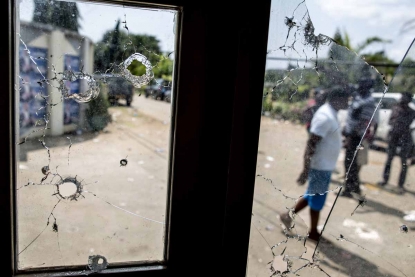 Bullet holes at the gate of opposition leader Jean Ping's headquarters.
(AFP / Marco Longari)
Bullet holes at the gate of opposition leader Jean Ping's headquarters.
(AFP / Marco Longari)Of course I wasn’t completely alone here. There may not have been other photographers from the main agencies, but there was television, there were people that you’ve met on other stories and whom you trust, there were other journalists. So you share contacts and tips. But it’s not the same level of comfort.
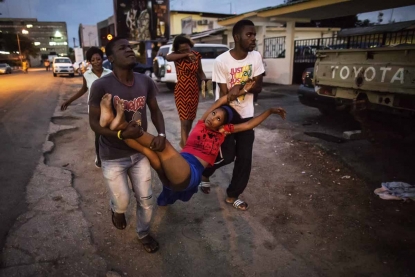 A relative of a man detained during clashes is carried to the hospital after fainting. (AFP / Marco Longari)
A relative of a man detained during clashes is carried to the hospital after fainting. (AFP / Marco Longari)Of course there are also positives to being alone. For one, I don’t have to worry about avoiding cameras and photographers in my frames. It may sound funny, but it’s certainly something that you always have to keep in mind when you’re working with a group of your colleagues -- making sure that we don’t end up in each other’s shots.
It’s also quite nice to be THE voice that tells the story. You have space to do anything you want. Nothing is redundant and everything needs to be said. But I have to repeat, it’s a lot of responsibility. You still have to tell the story that way that it needs to be told.
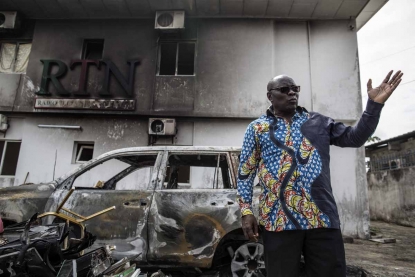 The head of RTN television in front of the charred remains of his car in the studios' courtyard. The station was attached after the results of the contested election were announced. (AFP / Marco Longari)
The head of RTN television in front of the charred remains of his car in the studios' courtyard. The station was attached after the results of the contested election were announced. (AFP / Marco Longari)It’s not by chance that I am here. At AFP we make a conscious choice to cover the continent as thoroughly as possible. You can say that’s one of our competitive advantages. It may sound like self-promotion, but it’s a question of constant dedication to telling African stories, not to leave anything out. Everything is important, everything touches the lives of people here.
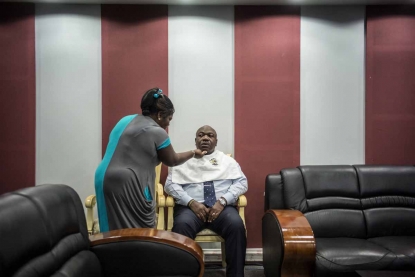 Gabonese President Ali Bongo Ondimba sits for make up ahead of a debate days before the election.
(AFP / Marco Longari)
Gabonese President Ali Bongo Ondimba sits for make up ahead of a debate days before the election.
(AFP / Marco Longari)With Gabon, it was frankly a no brainer whether to go or not. You read the story of the country and you see that it's at the crossroads. Forty-plus years of a single presidency and already a contested election in 2009. The ingredients for a disaster were spread out on the table. When you see this, you can’t turn away.
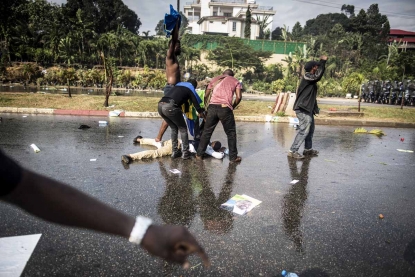 An opposition supporter lies on the ground after clashes with riot police.
(AFP / Marco Longari)
An opposition supporter lies on the ground after clashes with riot police.
(AFP / Marco Longari)I’m responsible for some 47 countries on the continent -- all except the Arabic-speaking ones. So I constantly have to make choices about coverage. When I see the ingredients like in Gabon, I can’t say no. We have to be there. And I’d rather do it myself because of the years of experience that I have covering such situations, including in Africa.
You start working on the story long before you arrive in the country. You do research on the situation, the main players, you begin to have an idea of which spots in the city you have to visit. It was my first trip to Gabon, so I made sure to prepare well.
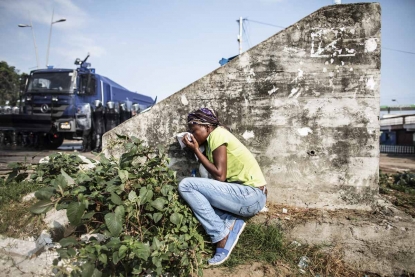 A woman takes cover during clashes between opposition protesters and riot police.
(AFP / Marco Longari)
A woman takes cover during clashes between opposition protesters and riot police.
(AFP / Marco Longari)When you land in a place, you immediately begin to establish a network of contacts. Sounds corny, but it starts with your taxi driver. You make sure you get a really good one. How can you tell a good one from a bad one? That’s where the experience comes in. Each person has his or her own little measurements that they go by, but I think it all comes down to a gut feeling.
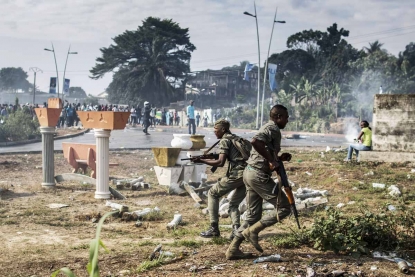 Gabonese soldiers run during post-election clashes with opposition supporters.
(AFP / Marco Longari)
Gabonese soldiers run during post-election clashes with opposition supporters.
(AFP / Marco Longari)The way you tell the story comes down to your experience, the capacity that you’ve developed to read a situation and that you have enough time to prepare on the ground. I arrived in Libreville a week before the election. It was my first time in the city, so my first day I took very few pictures. I spent the day driving around.
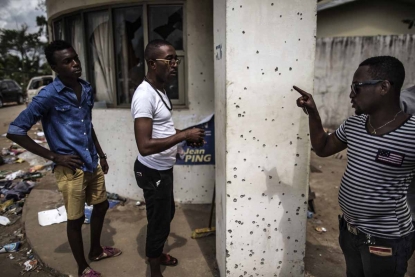 Walls riddled with bullets at opposition leader's Jean Ping's headquarters.
(AFP / Marco Longari)
Walls riddled with bullets at opposition leader's Jean Ping's headquarters.
(AFP / Marco Longari)I changed two or three drivers and I asked to be taken around their own neighborhoods. I was trying to get a sense of topography, to get a sense of how long it would take to get from one point in the city to another, where the main points were, the places where you think things may happen.
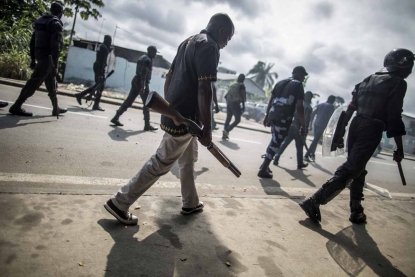 Gabonese police clear barricades in the streets near parliament.
(AFP / Marco Longari)
Gabonese police clear barricades in the streets near parliament.
(AFP / Marco Longari)Of course you visit the main political parties, you introduce yourself, you leave your number, you get theirs. And, based on your research and your understanding of the situation and how the story may develop, you build your network. You go into a certain bakery in a certain neighborhood, you talk, you get their number, you leave yours. So when things start happening, you can give people a call to find out the situation across the city. Ordinary citizens usually have a good read on a situation.
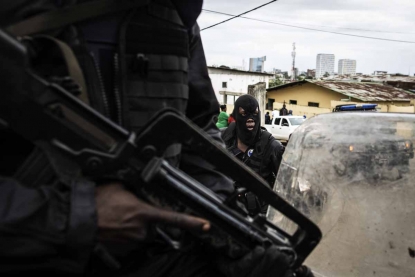 Gabonese police secure a neighborhood in Libreville following the deadly post-election clashes.
(AFP / Marco Longari)
Gabonese police secure a neighborhood in Libreville following the deadly post-election clashes.
(AFP / Marco Longari)And you rely heavily on your bureau. And that’s another point where AFP has an advantage -- we have a permanent bureau in Libreville, with their set of contacts, which gives us a huge leg up on a major story like this.
When you tell the story of a particular country, every aspect of daily life and occurrences in that country are important. So you keep an eye out for everything. For example, last week, we went to cover a Catholic service the day after the election. The situation in the country was tense -- it was as if everyone was holding their breath as the votes were being counted.
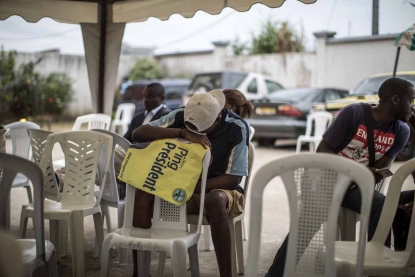 Opposition supporters sleep after waiting all night for election results.
(AFP / Marco Longari)
Opposition supporters sleep after waiting all night for election results.
(AFP / Marco Longari)So the day after the election, as they counted the votes, we went to a church. The country was holding its breath. To be in a church, in the middle of a congregation -- it could show that suspense and get that feeling of hoping, praying for the best. And I think it did. The pews in the church were half empty. Usually they’re packed.
Of course you keep an eye out for unusual or odd pictures. That’s how I got the women who washed her feet in the downpour with the passing nuns.
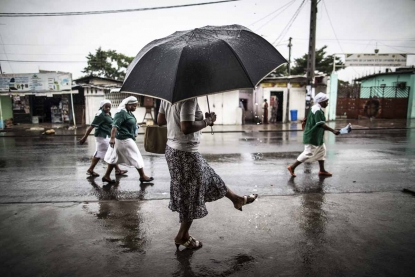 (AFP / Marco Longari)
(AFP / Marco Longari)What surprised me in Gabon was the level of access that I was granted by the security forces. How much you’re allowed to cover is usually a good barometer of where the country is on a democratic scale. Since I was alone, it would have been very easy to restrain me.
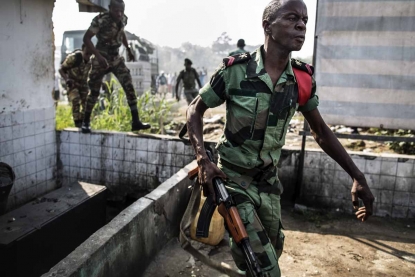 A Gabonese soldier during the post-election clashes.
(AFP / Marco Longari)
A Gabonese soldier during the post-election clashes.
(AFP / Marco Longari)But I was able to cover the confrontations quite freely. I was taken aback (you can do as much research as you can, but a story unfolds as it will), by the immediate explosion of anger when the results were announced. It wasn’t something that trickled down and slowly brewed until it reached a boiling point. It was an immediate explosion of rage. For 24 hours things were happening really fast, the storming, the burning, the unrest. The morning after the city woke up completely shocked by the spread of the violence, the barricades, the closed shops.
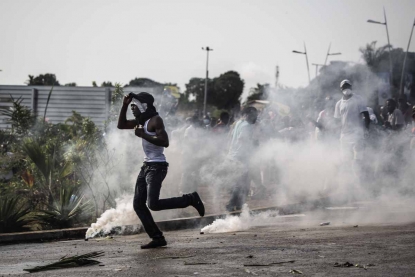 Protesters and police clash in Libreville after the election results were announced.
(AFP / Marco Longari)
Protesters and police clash in Libreville after the election results were announced.
(AFP / Marco Longari)And again I come back to the importance of being there. We have told a chapter in the continent’s history. We have this ambition of understanding the narratives on the continent, this multi-faceted world that is developing here. We simply can’t avoid being present on stories like this.
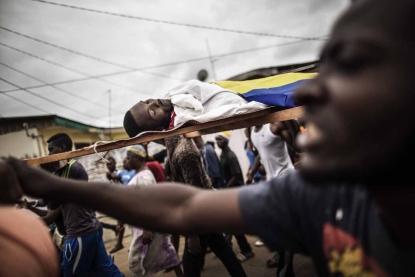 The funeral procession of a man killed in the post-election clashes.
(AFP / Marco Longari)
The funeral procession of a man killed in the post-election clashes.
(AFP / Marco Longari)Stories like the Gabon election give us a glimpse into which direction the continent is taking. Yes, it’s more unrest in another African country. But there are nuances. The response of the people to the situation -- this immediate explosion of rage -- that tells you a lot about where the country is at. The evolution of the security forces that allow a photographer to cover unrest freely -- that tells you a lot about where the country is and where it might be heading.
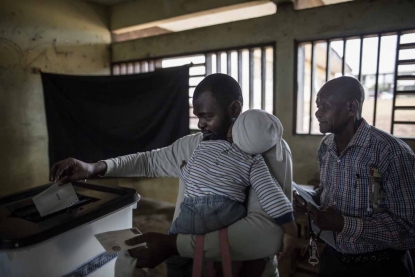 Voters queue to cast their ballots.
(AFP / Marco Longari)
Voters queue to cast their ballots.
(AFP / Marco Longari)It is a sign that a certain understanding of democracy is slowly trickling down to the continent. The fact that I’ve been allowed to work so far says that despite everything in the background, something is more accessible, something is changing…
This blog was written with Yana Dlugy in Paris.
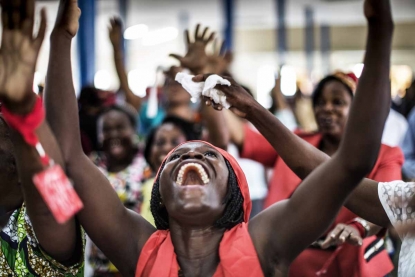 (AFP / Marco Longari)
(AFP / Marco Longari)







